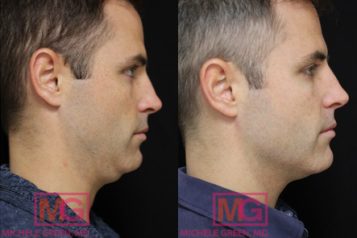 Photo Credit: Shutterstock
Photo Credit: Shutterstock
Have you ever experienced a weird pain in your chest and you can’t quite pinpoint what it could be from? This is where Haute MD expert Dr. Ryan Houk of Naples Heart Rhythm Specialists comes into play because you must understand what chest pain can mean for you. Haute Beauty sat down with Dr. Houk and his wife, Internal Medicine Physician, Dr. Deborah Houk to understand the basics of chest pain, and what at the end of the day to look out for when you experience this uneasiness and tightness.
What type of chest pain should you look out for?
As a cardiologist, the types of chest pain symptoms that we are most concerned about are typically exertional symptoms. However, it’s important to note that cardiac pain is not always chest pain. Some people have exertional back pain, jaw pain, or shoulder pain. But the key feature is the exertional quality. We define cardiac pain as angina, which by definition is brought on by exertion and relieved by rest.
When should you seek medical attention?
If you’re having acute chest pain and are worried that you may be having a heart attack, you should always call 911. Do not drive yourself to the ER as this will delay diagnosis and treatment. It is very important to receive prompt care if someone is having a heart attack.
How do you assess chest pain?
When looking at a patient with chest pain, I need to hear the entire story as I typically focus on the trigger for the chest pain, with specific emphasis on if there’s an exertion quality. For example, if someone describes experiencing chest pain symptoms every time they physically exert themselves and the symptoms resolve with rest, I’d be very concerned. Features that sway me away from the heart being the cause of the chest pain are when the symptoms are reproducible with pushing on the chest wall, when they are positional in nature, if they are associated with breathing, or if they are consistently reproducible with food. These types of chest pain are often not due to the heart, but it’s important to always be evaluated by a doctor if you’re experiencing any chest pain at all.
 Photo Credit: Shutterstock
Photo Credit: Shutterstock
What immediate actions are appropriate for chest pain?
If you’re having chest pain, you must seek immediate medical attention. Call 911.
What are the causes of chest pain?
Chest pain can be caused by anything between your skin and your heart… and in between your ears. This means that there are many causes of chest pain, including cardiac chest pain, but also gastric reflux, costochondritis, and even anxiety.
Does chest pain always signal a heart attack?
People have chest pain for lots of reasons as discussed above, so no, chest pain doesn’t always signal a heart attack. To be safe, however, always get evaluated by a physician promptly if you have chest pain. If you want to find out your risk of heart attack, call NHRS at 239-263-0849 to schedule a consultation for a stress test. At our office in Naples, FL, in addition to standard stress tests, we also offer Cardiac PET, a more advanced type of stress test. Cardiac PET is the most accurate non-invasive nuclear stress test of the heart. Prognostically, someone who has a normal Cardiac PET has a less than 1% cardiac event rate per year, meaning a less than 1% risk of having a heart attack.






















